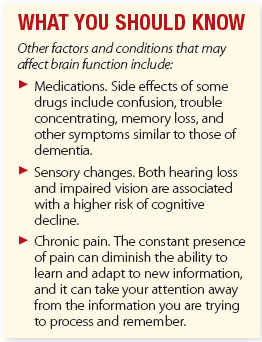How to Differentiate Between Signs of Normal Aging and Dementia
It’s not surprising that people worry about getting Alzheimer’s disease or another form of dementia as they get older: An estimated one in every 10 Americans over age 65 has Alzheimer’s disease, according to the Alzheimer’s Association. And women have even more reason for concern, since they have almost double the risk as men of getting Alzheimer’s.
You may have heard or read that changes in your memory and other cognitive functions are not a normal part of aging, but Lisa Ravdin, PhD, director of the Weill Cornell Neuropsychology Service in the Department of Neurology, says this isn’t accurate.
“Your memory absolutely does change as you get older. Just as there are physical changes elsewhere in the body that occur as you get older, there are normal changes in the structure of the brain associated with aging that affect your brain function, including memory and other cognitive functions,” she explains.

Age-Related Changes
As your brain ages, cell damage and death occur, the brain atrophies (shrinks and loses volume), and the neurons in your brain are less able to quickly and effectively transmit information. These structural changes are accompanied by changes in cognitive abilities.
“Older brains don’t function as efficiently as younger brains; the aging brain processes, stores, and retrieves information at a slower pace. It also takes longer to learn new things, and you may need more exposure to information,” explains Dr. Ravdin.
If you’re not a memory expert, it can be very difficult to discern between normal cognitive changes and changes that suggest the possibility of dementia. But the more you understand about the differences, the easier it will be to avoid unwarranted fear and panic the next time you have a “senior moment.”
Clear Differences
Normal, age-related changes won’t interfere with your ability to engage in activities of daily living, such as bathing, dressing, shopping, and paying bills. But changes that occur due to dementia do interfere with daily activities.
A person with dementia may stop practicing good hygiene, repeatedly forget to pay bills, and put his or her own and others’ safety at risk by failing to turn off the oven or lock the door. As the disease progresses, so do the frequency of the unsafe behaviors.
Your own observations about how your brain is working also provide information about your brain function.
“People who have a memory disorder usually aren’t as concerned about memory problems as the people around them,” explains Dr. Ravdin. “Conversely, people experiencing normal, age-related cognitive changes may worry when they misplace their keys more frequently or have trouble remembering someone’s name. People who are concerned about and very aware of their memory failures generally don’t have a severe dementia.”
More Examples
A person’s response to neurological testing can shed light on his or her degree of memory loss.
“People who have normal, age-related changes will usually be able to tell you most or all of the test items, as well as what items they got wrong. But people with dementia may be unable to remember most of the items or how they scored—or they may be unable to recall that they took a test,” says Dr. Ravdin.
Problems with word usage and recall can reveal much about a person’s cognitive well-being. Older adults often complain that they can’t always recall words; they may feel like the word is on the “tip of their tongue” but just beyond their reach. In a brain that’s aging normally, the word is not lost; you just aren’t able to retrieve it immediately. In most cases, you will think of the word eventually. But patients with dementia cannot retrieve these “missing” words later; the brain connections required for retrieval have been damaged, and they can’t be repaired.
Forgetting someone’s name or where you put your keys does not suggest that you have Alzheimer’s disease. However, if you repeatedly forget your spouse’s name or you ask the same questions repeatedly because you can’t recall the answers, it’s time to see a neuropsychologist for an evaluation.
The post How to Differentiate Between Signs of Normal Aging and Dementia appeared first on University Health News.
Read Original Article: How to Differentiate Between Signs of Normal Aging and Dementia »

